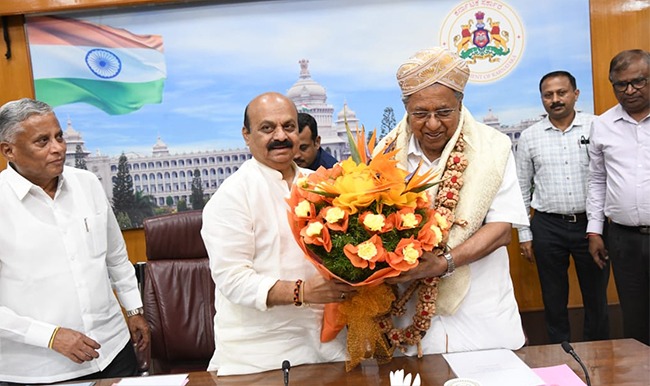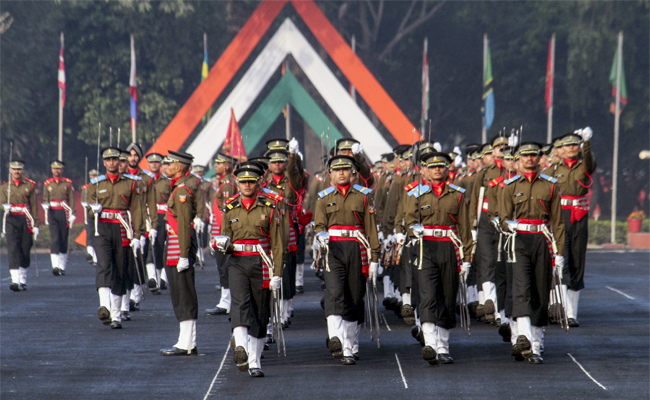Bengaluru, Sep 18: Kerala Chief Minister Pinarayi Vijayan on Sunday called on his Karnataka counterpart Basavaraj Bommai here and discussed many issues including development of border region.
According to sources, Bommai and Pinarayi held talks related to the development of border region and night traffic on the highway running through the Bandipur tiger reserve.
Opening the NH passing through the ecologically sensitive Bandipur tiger reserve for night traffic had been a long pending demand of Kerala.
The southern state had also approached the Supreme Court to allow night traffic and filed an affidavit saying it was highly discriminating for the people living in the surrounding areas of Bandipur National Park to restrict their right to move freely, they said.
During the meeting, Bommai told Vijayan that the highway running along the Bandipur Tiger Reserve cannot be opened citing Supreme Court order.
The two leaders also held discussion on two pending railway projects and few other highway projects, sources added.
Hon'ble Chief Minister Shri @BSBommai had a fruitful meeting with Shri Pinarayi Vijayan, the Chief Minister of Kerala. Various issues of inter state and mutual interest were discussed.@pinarayivijayan pic.twitter.com/mvrqt8oeM8
— CM of Karnataka (@CMofKarnataka) September 18, 2022




Let the Truth be known. If you read VB and like VB, please be a VB Supporter and Help us deliver the Truth to one and all.
Pune (PTI): Saee Jadhav from Maharashtra’s Kolhapur has become the first woman Territorial Army officer to complete pre-commissioning training at the Indian Military Academy (IMA), Dehradun, breaking the institution’s 93-year-old tradition of male-only officer training.
Chief Minister Devendra Fadnavis congratulated her and said her achievement is an inspiring milestone that gives direction to the dreams of countless young girls across the country.
Jadhav, 23, was commissioned as a Lieutenant during the Passing Out Parade of the 157th course held last week, marking a historic milestone for the IMA, which was established in 1932 and has since produced generations of Army officers.
She was commissioned into the services on December 13 during the commissioning ceremony at IMA, Dehradun.
Speaking to PTI, Saee’s father Sandip Jadhav, a serving major with the Territorial Army, said that Saee has been commissioned into the 130 Territorial Army (ecological ) battalion of Kumaon Regiment at Pithoragarh in Uttarakhand.
Saee is currently pursuing her MBA through distance learning, he said.
“While pursuing her MBA, she was also preparing for competitive exams and TA (Territorial Army). She appeared for the exam in December 2023. There was only one vacancy for a woman officer in TA and since her rank was at the top in merit, she was selected,” said Major Jadhav.
“She is now commissioned into 130 Infantry Battalion (TA) of Kumaon Regiment at Pithoragarh in Uttarakhand,” he said.
Jadhav said her daughter was inclined to join the armed forces, given the family’s armed forces background. “As parents, we feel proud that our daughter followed her dream and chose to serve the nation,” he added.
Maharashtra Chief Minister Devendra Fadnavis also congratulated “Marathi Mulgi” Saee.
“She has created history by becoming first woman officer cadet to pass out of IMA in 93 years… It is a matter of immense pride that this honour has gone to a Marathi Mulgi!,” he wrote in a post on X.
“This is not just an individual success story, but an inspiring milestone that gives direction to the dreams of countless young girls across the country. Educated and brought up in Belgaum and originally from Kolhapur, Sai represents the 4th generation of the Jadhav family to carry forward the legacy of service to the nation,” he added.





